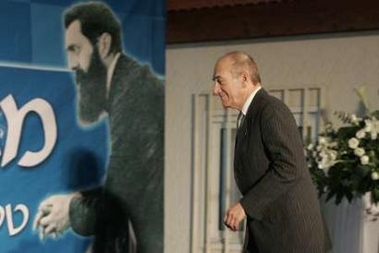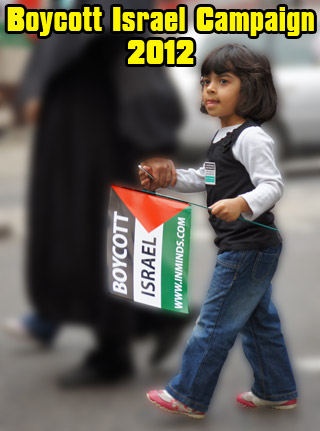
 Innovative Minds © 2014. All Rights Reserved. www.inminds.co.uk | |
Jerusalemâs apartheid tramwayPhilippe Rekacewicz and Dominique Vidal, Le Monde diplomatique Two French companies are involved in the construction and operation of a light rail system from the centre of Jerusalem to a northern terminus. It is promoted as a unifying project: in fact, it will be yet another way to isolate the Palestinians.
According to international law, the route currently planned is illegal. It brings the [illegal] Israeli settlements in East Jerusalem closer to the city centre in West Jerusalem: French Hill, then Pisgat Zeev, then Neve Yaakov in the north, and later, with eight more routes planned, many more. The tram facilitates colonisation.
The tram will not operate before 2009 but itâs already a presence across Jerusalem, and garish ads show it running beside the walls of the Old City. The strangest ad features a pensive Theodor Herzl; in his book Altneuland, published two years before his death in 1902, Herzl dreamed of an electric tram system as a symbol of the Jerusalem of the future. A century later this ecological and economic solution is a necessity. âOur city is in gridlock,â said Shmulik Elgarbly, Israeli spokesman for the mass transit system. âEver since cars got cheaper, weâve had terrible congestion in Jerusalem. By 1980 the percentage of urban dwellers using public transport dropped from 76% to 40%.â New roads jam up almost as soon as they are finished. Most streets are too narrow for bus lanes. The geological structure under the city would be ideal for the construction of a subway system, but why not let passengers see the most beautiful city in the world? Ten years ago those arguments convinced Jerusalemâs mayor, then Ehud Olmert, of the need for a light rail system. The project would be financed by the private sector under a Build-Operate-Transfer (BOT) contract and the network would be handed over after 30 years. An international tender was put out in 2000 and the French company Alstom won the construction bid. Two years later Connex, the subsidiary of another French company, Veolia, won the operating rights. They formed a consortium called Citypass with two Israeli companies, Ashtrom Construction and Pollar Investment, as well as two banks, Hapaolim and Leumi. The contract was signed in July 2005. The initial aim is to carry 500 passengers by 2009 on each of 25 trains running between the terminus points of Pisgat Zeâev and Mount Herzl. According to Elgarbly, the project will be profitable if two conditions are met: âIt must be perfectly safe and not a target for suicide attacks; and the route must meet the needs of the greatest possible number of inhabitants. We based our projections on 150,000 passengers a day. That is why the tram must serve the Jewish quarters [Israelâs politically correct term for settlements] such as Pisgat Zeâev, as well as Arab quarters like Shuâfat. At present there are two separate bus networks serving those areas but thereâs no room for two separate tramlines in Jerusalem. Weâre building a single, peacetime tramway.â The road to hell is paved with good intentions, even in the holy city. This project has raised many urban and, more important, political objections. It uses a stretch of Route 60, depriving Palestinians of a vital artery to the city and, beyond it, between the north and south of the West Bank. Yet Elgarbly insists that: âWe will serve both populations in Jerusalem.â That seems doubtful. The fare, which is reasonable for Israeli passengers at $1.37, will be expensive for those Palestinians currently using the small buses, on which the fare is just 82 cents. There is also the question of how the continuing safety of the tram can be assured. How will the settlers react to seeing Arabs travelling on the tram? One person we spoke to wondered whether there should be separate carriages for Arabs and Israelis. Who will park and ride?
The [French] diplomat confirmed that the foreign ministry âalways had strong reservations about French companies taking part in this projectâ. In the event of confrontation âit would give rise to a crisis on the scale of the Muhammad cartoons rowâ. France would be in violation of international law. He added âThat tram is the tram of apartheidâ
At the North Shuâfat stop, planners have designed park-and-ride lots for suburban commuters, especially Palestinians. The Israeli project director, Shmulik Tsabari, who came with us on our site tour, seemed oddly unaware of the fact that a large number of potential passengers, such as the inhabitants of Ras Khamis, or the Shuâfat and Anata refugee camps, live behind the separation wall. One checkpoint in the wall is open at present, but that doesnât mean it will remain so in the future. The army already often closes it during the rush hour so that settlers can circulate more easily. So who will use the park-and-ride lots â if they are built? âThe 50 dunum (5 hectare) plot belongs to dozens of Palestinian families and the town hall has stymied negotiations,â explained lawyer Mahmud al-Mashni. âBut a permit is required to build on the land since itâs in a green zone. The city authorities plan to use part of the area for the parking lot and allow the owners to build a shopping centre and homes on the remainder. But the owners canât afford to do that â they wonât be able to pay the taxes, which are far higher on building land. According to Israeli law, the owners should get 60% of the landâs value in the event of state expropriation. Instead theyâre being offered a âgenerousâ 25%.â Many observers believe that at the first security threat the trams will cease to go via Shuâfat. Instead they will follow the safer roundabout route inside the wall. It will mean explaining away the expensive infrastructure that may already have been built, but that is not the point. According to international law, the route currently planned is illegal. It brings the Israeli settlements in East Jerusalem closer to the city centre in West Jerusalem: French Hill, then Pisgat Zeev, then Neve Yaakov in the north, and later, with eight more routes planned, many more. The tram facilitates colonisation. This goes against the Fourth Geneva Convention of 12 August 1949, ratified on several occasions since by the United Nations Security Council. Resolution 465 of 1 March 1980 stipulates: âAll measures taken by Israel to alter the physical character, the demographic composition, the institutional structure or status of the Palestinian territories including Jerusalem, have no legal validity.â So if this new project is to be used specifically for colonisation, Israel should not get assistance from other countries. For a long time the Palestinians did not react, but now they are sounding the alarm. In October 2005 President Mahmoud Abbas raised the issue with a visibly embarrassed President Jacques Chirac. A month later the French foreign minister, Philippe Douste-Blazy, sent a carefully worded letter to the chairman of the Association France-Palestine Solidarité, which is campaigning against the tram, saying: âPrivate companies bidding for international tenders in no way reflect a change in Franceâs well-known stance on Jerusalem.â He went on to stress Franceâs attachment to Jerusalemâs international status as laid down when partition was declared in 1947: âFrance and the European Union have a clear and consistent position on the illegal nature of the settlements in the territories occupied by Israel in 1967 as well as the security wall that Israel is building, which violates international lawâ[1].  Israeli Prime Minister Ehud Olmert walks near a poster depicting Theodore Herzl, father of modern Zionism, during a ceremony for the light rail in Jerusalem November 22, 2006 Occupation entrenchedThis clarification did not prevent Nasser al-Kidwa, then the Palestinian Authorityâs foreign minister, from writing to Alstom CEO Patrick Kron on 6 January 2006, to criticise Alstomâs involvement âwhich is not purely commercial, but carries extremely important implications in terms of aid to Israel in its illegal settlement policy in and around East Jerusalem, and which is viewed [by the Palestinian Authority] as an attempt to legitimise this policyâ. This, he claimed, runs counter to âthe principles that have long been held in Franceâ. In Jerusalem two advisers from the Palestine Liberation Organisation, Fouad Hallak and Wassim H Khazmo, confirmed this view: âUltimately, the tramline will connect West Jerusalem with the Jewish settlements in East Jerusalem. It is therefore entrenching the occupation. Without East Jerusalem, there cannot be a Palestinian state.â Meanwhile, the Arab League condemned the illegal construction of the tramline at its March 2006 summit in Khartoum. Alstom and Connex were invited to withdraw immediately from the project to avoid steps being taken against them, and the friendly French government was urged to adopt a position on this issue in accordance with its responsibilities and international law. Never has there been a greater divide in the official and unofficial positions of French diplomacy. This is a far cry from âbusiness is businessâ, which is what an economic adviser to the French embassy in Tel Aviv [2] was quoted as having said. The consortium for the $518m Jerusalem tramway had also hoped to win the $1.29bn contract for Tel Aviv (in December 2006 it found out that it hadnât). Even before Douste-Blazy, there were other French ministers, including Nicolas Sarkozy, who had talked about the profits to be made. Yet there are laws behind the money. According to international lawyer Monique Chemillier-Gendreau: âA state is accountable for the actions of its countryâs major companies if they break international law and if the state does not do what it can to prevent them.â Doubtless aware of the risk, a French consulate official in Jerusalem stressed that neither Alstom nor Connex benefited from any export credits or guarantees from Coface, the official French export guarantee department. A diplomat in Paris, who wished to remain anonymous, went further: âThe French foreign office has always discouraged companies from taking part in this venture.â Maybe. But in that case why did Gérard Araud, Franceâs ambassador to Israel, take part in the official contract-signing ceremony in the offices of Prime Minister Ariel Sharon? The diplomat confirmed that the foreign ministry âalways had strong reservations about French companies taking part in this projectâ. In the event of confrontation âit would give rise to a crisis on the scale of the Muhammad cartoons rowâ. France would be in violation of international law. He added âThat tram is the tram of apartheidâ and claimed that the lawyers hired by Alstom and Connex are âdubiousâ, which confirmed recent comments by the two companies. Despite all this, the contract was signed. Our diplomat saw that as an expression of âthe climate in 2004 when there was a reconciliatory mood in Tel Aviv. But even so, that goal doesnât justify stupidity. And thatâs exactly what this tramway is. Pure stupidityâ. He added that the stupidity owed much to the personality of the then French ambassador, Gérard Araud, who was âa firm believer in the project. He certainly asked to take part in the contract-signing ceremony.â The light rail system may be a good solution for the inhabitants of Jerusalem, but why did the Israeli government not discuss it with the Palestinian Authority first? Since they made no attempt to do so, the Israeli government is open to accusation, at home and abroad, of using the tram to strengthen its policy of occupation, colonisation and annexation. Having Theodor Herzl as the tramwayâs poster boy may be a Freudian slip. Herzl certainly extolled modernity. But first and foremost he was the founder of Zionism.
* Philippe Rekacewicz is a geographer and cartographer for âLe Monde diplomatiqueâ and the United Nations Environment Programme (UNEP/Grid-Arendal in Norway)
[1] This and the following quotations are from the AFPS website, www.france-palestine.org [2] Jerusalem Post, 7 June 2005. Source: http://mondediplo.com/2007/02/08tramway Also Of InterestPage URL: http://www.inminds.co.uk/article.php?id=10044
|
|
Support Us
If you agree with our work then please support us.Campaigns INMINDS Facebook Live Feed Latest Video's
INMINDS Twitter Feed Tweets by @InmindsComFeatured Video's
You need Flash player 8+ and JavaScript enabled to view this video.
[all videos (over 200)..] Featured MP3 Podcast  "[Deportation at the airport] We saw the injured [Turkish] men going through.. a lot had a leg cut out of their trousers or an arm cut out of their top. It had been cut out to treat their wounds.. they were covered in blood, blood that had been there for three days, and some of them had wounds that were still bleeding.. What upset me most was seeing the dozen men, one after another, hobbling across the terminal, with a bandaged foot. I couldn't ask them why so many of them had a bandaged foot, I couldn't ask them what had happened, because if they spoke or if any of us spoke to them the Israelis beat the injured person.. We later found out that they had these injuries on the tops of their feet from when the troops came down from the helicopter on the Mavi Marmara, and they came down firing - they had been shot from above. Some of the men that were killed were shot at close range - head and chest, but a dozen of the men who were shot, among 59 people who were shot, they were shot at the tops of their feet - the bullets were coming down.. They weren't given a wheelchair or a pair of crutches, and if any of the other passengers stood up and tried to offer [help].. that person was dragged away and smacked by these Israelis. The Israeli soldiers sat on the floor, laughed and sniggered and made every one of these Turkish men hobble and hop all the way across, some 200 metres, everyone of them, one by one, made to do that purely for the sick amusement of the Israeli soldiers." Survivor of the flotilla massacre speaks candidly of her experience Ratstar Centre London, 22 July 2010 [46min / 42Mb] [all podcasts..] Newsletter Feedback |
 |
 |













































